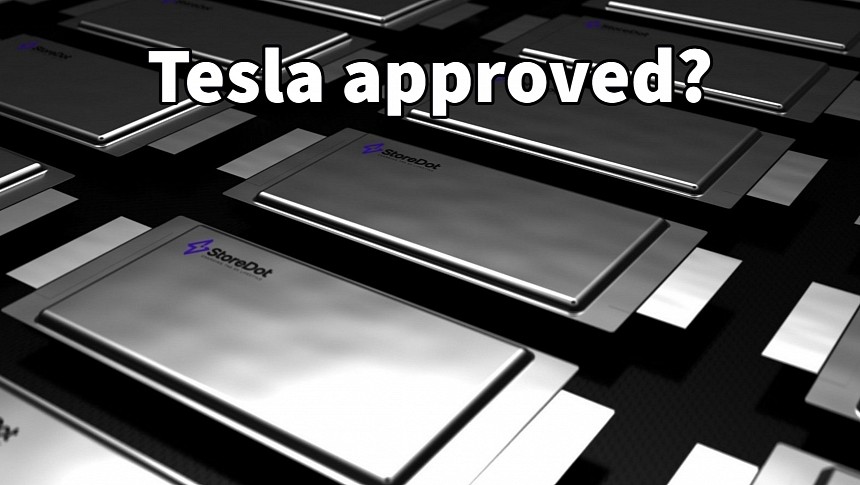Tesla is one of the pioneers of Li-ion battery technology, with close connections to the academic world. Still, it remains open to using other companies' technologies when they prove superior. A recent report claims Tesla is analyzing StoreDot's Extreme Fast Charging (XFC) battery technology. XFC promises to add 100 miles of range in just 5 minutes of charging.
Although Tesla is advancing its own battery technologies, it's not opposed to using other companies' products when it makes sense. The EV market leader works with external suppliers such as Panasonic, LGES, Samsung, CATL, or BYD for the battery cells it uses. At the same time, it develops and produces its own battery cells. Tesla also funds Li-ion battery research and collaborates closely with university research labs. This is the way to remain relevant in a fast-paced industrial environment.
A recent report by USA Today claims that Tesla is examining the Extreme Fast Charging (XFC) battery technology developed by the Israeli startup StoreDot. The XFC technology promises extremely short charging times thanks to using nanomaterials without compromising the battery capacity. Its silicon-based Li-ion battery promises a 300-Wh/kg energy density and the ability to add 100 miles of range in 5 minutes of charging. StoreDot calls this 100in5 and thinks it should be ready for mass production next year.
StoreDot also works on improved cells with higher energy density and faster charging time. Its 100in3 technology (110 miles in 3 minutes) will use a solid electrolyte and offer an energy density of 450 Wh/kg from 2028. By 2030, the 100in2 cells will feature lithium-free chemistry to achieve a 550-Wh/kg energy density.
The fact that Tesla is examining StoreDot's technology doesn't necessarily mean that the two companies are about to announce a partnership. Still, I would not rule out such a possibility if the XFC cells prove they are as good as StoreDot claims. The long charging times are among the most common reasons people are reluctant to buy an electric vehicle. Significantly reducing the charging times would make EVs behave more like their ICE counterparts, which can be refueled in a few minutes.
Tesla is likely conducting rigorous testing to evaluate safety, reliability, and longevity. The EV maker has been at the forefront of Li-ion battery technologies but has not used unproven technologies in its vehicles. This is why its batteries have been known to offer trouble-free operation for many years. StoreDot will have to prove its batteries are production-ready before Tesla considers installing them in any of its EVs.
StoreDot recently announced that 15 companies were evaluating its XFC technology. Tests showed that its XFC cells could withstand over 1,000 fast-charging cycles before losing 20% of their original capacity. The tests involved charging the cells from 10% to 80% in about 10 minutes and discharging them in an hour. Usually, fast charging takes a toll on battery life, so these results are promising.
A recent report by USA Today claims that Tesla is examining the Extreme Fast Charging (XFC) battery technology developed by the Israeli startup StoreDot. The XFC technology promises extremely short charging times thanks to using nanomaterials without compromising the battery capacity. Its silicon-based Li-ion battery promises a 300-Wh/kg energy density and the ability to add 100 miles of range in 5 minutes of charging. StoreDot calls this 100in5 and thinks it should be ready for mass production next year.
StoreDot also works on improved cells with higher energy density and faster charging time. Its 100in3 technology (110 miles in 3 minutes) will use a solid electrolyte and offer an energy density of 450 Wh/kg from 2028. By 2030, the 100in2 cells will feature lithium-free chemistry to achieve a 550-Wh/kg energy density.
The fact that Tesla is examining StoreDot's technology doesn't necessarily mean that the two companies are about to announce a partnership. Still, I would not rule out such a possibility if the XFC cells prove they are as good as StoreDot claims. The long charging times are among the most common reasons people are reluctant to buy an electric vehicle. Significantly reducing the charging times would make EVs behave more like their ICE counterparts, which can be refueled in a few minutes.
Tesla is likely conducting rigorous testing to evaluate safety, reliability, and longevity. The EV maker has been at the forefront of Li-ion battery technologies but has not used unproven technologies in its vehicles. This is why its batteries have been known to offer trouble-free operation for many years. StoreDot will have to prove its batteries are production-ready before Tesla considers installing them in any of its EVs.
StoreDot recently announced that 15 companies were evaluating its XFC technology. Tests showed that its XFC cells could withstand over 1,000 fast-charging cycles before losing 20% of their original capacity. The tests involved charging the cells from 10% to 80% in about 10 minutes and discharging them in an hour. Usually, fast charging takes a toll on battery life, so these results are promising.






